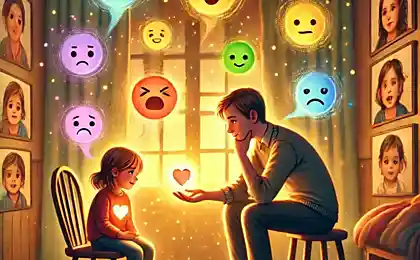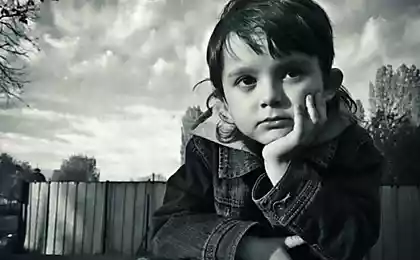191
Sit down, two: communication in the format of assessments
I spent two evenings in communication with my mother-in-law and caught myself on how much I was weaned from communicating in the format of assessments. They didn’t just stop hurting me, they became a foreign language.
“Do you think it’s good that your children don’t speak Russian well?” “How is Sasha with children, does he do enough?”, “Do you have a good job?”, “And the boss is good?”, “And they pay well?”, “And Tessa seems to me more pretty, right?”, “And Sasha’s diet is normal?”, “And why did he hit the sport at 40 years old, he will not work as a coach, this is generally normal?”
I'm lost in answers. I can say that I am sad that children prefer to speak English, but I do not see the strength and ability to force them to speak Russian. I can explain why. I can share how my feelings of guilt, laziness and futility struggle within me. I can say that Sasha plays with children in monopoly and teaches Danilovich somersaults, but I do not know if this is enough. I didn’t think about it in the “enough” category.
I don’t know if my job is good or if I’m getting paid. I know that I know how to do it and I get it at the market level, and that it will be good for someone and not good for someone, and that money may or may not be enough, and that depends. And that Tessa in my eyes is always beautiful, unique and unique, and I can't judge her on the scale of cuteness, not now, not before. And that Sasha has the kind of diet he has chosen, and that he does things that are close to him, and it brings him joy, and I don't know how normal it is and for whom.

I see situations as facts, feelings, trends, I don’t think of them in terms of ‘right’ or ‘bad’.I think about causes and consequences, decisions and feelings, my own and others'.
And I was thinking today, this is the difference in the language of digesting the world. Where does the need for evaluation come from? Why is there a cultural focus on “she’s stupid,” “he’s good,” “they’re all goats.” Cleaned up the room - a good boy. Knocked my sister, bad.
It's easier on the surface. Lacking the habit of making an immediate assessment forces you to listen to what he, this boy, is saying. And why he says it. And why does he say that? It makes you wonder what he feels there. The way he sees it. Why does he do that? And this in turn deprives the ability to see an object in a person, forces them to react, feel in response, empathize, understand, hear, think. The rubber stamp "They all went crazy there." Polykhayev saves from the trouble to understand what they really are.
A small child is a raw feeling. No logic, no relativity, no ability to mix, no awareness, no control – all this will develop much later. The child almost does not listen to words and does not follow the voice of reason - he greedily searches for our feelings behind our words.
This is why psychologists say that an absent, ignorant parent is much scarier than an emotional parent. Children speak to us in the language of raw, undimmed feelings, not yet constrained by an analysis of their correctness, decency, adequacy and usefulness. The language of a young child is the language of feelings, and the answer that children seek is our feelings.
What is an assessment? Evaluation is the rejection of co-feeling. It is the rejection of the discovery of the “I” – “I see”, “I understand”, “I feel pain”, “I feel lonely”, “I am hurt”, “I am hurt”, “I am happy”, “I am glad”, “I am confused”, “I am ashamed” – and the substitution for judgment, the resolution of who you are. Evaluation is the denial of dialogue at the level of feelings. Speaking to the child in the language of evaluation, we deny the child feelings, replacing them with judgments, judgments. He speaks to us in the language of the senses, and in response he hears Tarabar. And quickly learns Tarabar, because children are designed to learn and adapt. And he becomes an adult with a sacramental question, “Is this normal?”
When we are wounded by unbearable grief, we close our senses to survive. I watch old war movies, and I'm struck by the number of prohibitions on feelings. Just died in the fire her children, "Nunu, gather, war, not so endured."
Yes, in the stress of survival, we turn off a lot – we stop feeling pain, cold, hunger, sympathize. And then we raise our children, not knowing how to respond to them with the language of feelings, and they freeze it off for themselves too, replacing them with an assessment as a way of orienting themselves. A frostbitten sensation of the body is replaced by counting calories, frostbitten emotions are replaced by assessments of “stop”, “do not pump”, “nonsense”.
We speak the language we know, and if from childhood we know that the answer to grief, resentment, pride, hope was a detached person with a machine gun ratings “like small”, “imagined”, “good boy”, “abnormal” – then we lose ourselves from this unlearned language of feelings, get lost and scared, and evaluate, evaluate, evaluate. Maybe he has a diagnosis? Maybe I'm a bad mother. Maybe he's the wrong kid? It's not normal.
Feeling is so incomprehensible and abnormal because we cannot. Because every feeling inside is immediately translated into an evaluation. I'm mad at the baby, so I'm a bad mother. I want a pen, so I'm addicted. I'm offended, so I haven't worked enough on myself.
Learning any language is always difficult. Knowledge of a language is primarily an understanding of another picture of the world, another, not similar to your own. Same with the language of feelings. The decision not to appreciate, but to hear other people's feelings makes you feel in response. When a three-year-old yells he's been given a broken banana, the easiest way to say it's bullshit.
He is on your own, feelings and emotions - and you are to him in response to his, logic and evaluation, Tarabar. But he doesn't understand Tarabar, he only feels that he's not understood, and he learns Tarabar. And then a big one grows up and writes to the desert of the Internet: “Nobody understands me,” “I want to have my hands,” “I just want to be hugged.”
5 phrases of manipulators that can drive crazy anyone
Eckhart Tolle: Take your life into your own hands
Until we understand that we must try to remember the forgotten language of feelings, we will not build intimacy. We will breed generation after generation of those who vaguely want to handle it, but know nothing about it. Until we learn the lost language of feelings in a disciplined and humble way, we will never understand our children.
Remove the untranslatable cacophony of children's raw feelings by evaluating "he's just small and stupid" much easier than even seeing them. Seeing and analyzing them is easier than trying to understand them. Trying to understand is easier than letting yourself feel. Than picking up. How to feel all the resentment of the wrongness of a world in which a banana is broken.
P.S. And remember, just by changing your consciousness – together we change the world!
Source: www.womanfrommars.com/tag/ %D1%80%D0%BE%D0%B4%D0%B8%D1%82%D0%B5%D0%BB%D1%8C%D1%81%D1%82%D0%B2%D0%BE
“Do you think it’s good that your children don’t speak Russian well?” “How is Sasha with children, does he do enough?”, “Do you have a good job?”, “And the boss is good?”, “And they pay well?”, “And Tessa seems to me more pretty, right?”, “And Sasha’s diet is normal?”, “And why did he hit the sport at 40 years old, he will not work as a coach, this is generally normal?”
I'm lost in answers. I can say that I am sad that children prefer to speak English, but I do not see the strength and ability to force them to speak Russian. I can explain why. I can share how my feelings of guilt, laziness and futility struggle within me. I can say that Sasha plays with children in monopoly and teaches Danilovich somersaults, but I do not know if this is enough. I didn’t think about it in the “enough” category.
I don’t know if my job is good or if I’m getting paid. I know that I know how to do it and I get it at the market level, and that it will be good for someone and not good for someone, and that money may or may not be enough, and that depends. And that Tessa in my eyes is always beautiful, unique and unique, and I can't judge her on the scale of cuteness, not now, not before. And that Sasha has the kind of diet he has chosen, and that he does things that are close to him, and it brings him joy, and I don't know how normal it is and for whom.

I see situations as facts, feelings, trends, I don’t think of them in terms of ‘right’ or ‘bad’.I think about causes and consequences, decisions and feelings, my own and others'.
And I was thinking today, this is the difference in the language of digesting the world. Where does the need for evaluation come from? Why is there a cultural focus on “she’s stupid,” “he’s good,” “they’re all goats.” Cleaned up the room - a good boy. Knocked my sister, bad.
It's easier on the surface. Lacking the habit of making an immediate assessment forces you to listen to what he, this boy, is saying. And why he says it. And why does he say that? It makes you wonder what he feels there. The way he sees it. Why does he do that? And this in turn deprives the ability to see an object in a person, forces them to react, feel in response, empathize, understand, hear, think. The rubber stamp "They all went crazy there." Polykhayev saves from the trouble to understand what they really are.
A small child is a raw feeling. No logic, no relativity, no ability to mix, no awareness, no control – all this will develop much later. The child almost does not listen to words and does not follow the voice of reason - he greedily searches for our feelings behind our words.
This is why psychologists say that an absent, ignorant parent is much scarier than an emotional parent. Children speak to us in the language of raw, undimmed feelings, not yet constrained by an analysis of their correctness, decency, adequacy and usefulness. The language of a young child is the language of feelings, and the answer that children seek is our feelings.
What is an assessment? Evaluation is the rejection of co-feeling. It is the rejection of the discovery of the “I” – “I see”, “I understand”, “I feel pain”, “I feel lonely”, “I am hurt”, “I am hurt”, “I am happy”, “I am glad”, “I am confused”, “I am ashamed” – and the substitution for judgment, the resolution of who you are. Evaluation is the denial of dialogue at the level of feelings. Speaking to the child in the language of evaluation, we deny the child feelings, replacing them with judgments, judgments. He speaks to us in the language of the senses, and in response he hears Tarabar. And quickly learns Tarabar, because children are designed to learn and adapt. And he becomes an adult with a sacramental question, “Is this normal?”
When we are wounded by unbearable grief, we close our senses to survive. I watch old war movies, and I'm struck by the number of prohibitions on feelings. Just died in the fire her children, "Nunu, gather, war, not so endured."
Yes, in the stress of survival, we turn off a lot – we stop feeling pain, cold, hunger, sympathize. And then we raise our children, not knowing how to respond to them with the language of feelings, and they freeze it off for themselves too, replacing them with an assessment as a way of orienting themselves. A frostbitten sensation of the body is replaced by counting calories, frostbitten emotions are replaced by assessments of “stop”, “do not pump”, “nonsense”.
We speak the language we know, and if from childhood we know that the answer to grief, resentment, pride, hope was a detached person with a machine gun ratings “like small”, “imagined”, “good boy”, “abnormal” – then we lose ourselves from this unlearned language of feelings, get lost and scared, and evaluate, evaluate, evaluate. Maybe he has a diagnosis? Maybe I'm a bad mother. Maybe he's the wrong kid? It's not normal.
Feeling is so incomprehensible and abnormal because we cannot. Because every feeling inside is immediately translated into an evaluation. I'm mad at the baby, so I'm a bad mother. I want a pen, so I'm addicted. I'm offended, so I haven't worked enough on myself.
Learning any language is always difficult. Knowledge of a language is primarily an understanding of another picture of the world, another, not similar to your own. Same with the language of feelings. The decision not to appreciate, but to hear other people's feelings makes you feel in response. When a three-year-old yells he's been given a broken banana, the easiest way to say it's bullshit.
He is on your own, feelings and emotions - and you are to him in response to his, logic and evaluation, Tarabar. But he doesn't understand Tarabar, he only feels that he's not understood, and he learns Tarabar. And then a big one grows up and writes to the desert of the Internet: “Nobody understands me,” “I want to have my hands,” “I just want to be hugged.”
5 phrases of manipulators that can drive crazy anyone
Eckhart Tolle: Take your life into your own hands
Until we understand that we must try to remember the forgotten language of feelings, we will not build intimacy. We will breed generation after generation of those who vaguely want to handle it, but know nothing about it. Until we learn the lost language of feelings in a disciplined and humble way, we will never understand our children.
Remove the untranslatable cacophony of children's raw feelings by evaluating "he's just small and stupid" much easier than even seeing them. Seeing and analyzing them is easier than trying to understand them. Trying to understand is easier than letting yourself feel. Than picking up. How to feel all the resentment of the wrongness of a world in which a banana is broken.
P.S. And remember, just by changing your consciousness – together we change the world!
Source: www.womanfrommars.com/tag/ %D1%80%D0%BE%D0%B4%D0%B8%D1%82%D0%B5%D0%BB%D1%8C%D1%81%D1%82%D0%B2%D0%BE























